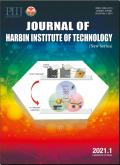Isolation, Identification of Bacillus Thuringiensis/ Cereus and Its Enhancement on Protein Wastewater Treatment by Rhodobacter Sphaeroides
Q4 Engineering
Journal of Harbin Institute of Technology (New Series)
Pub Date : 2016-10-25
DOI:10.11916/J.ISSN.1005-9113.2016.05.010
引用次数: 0
Abstract
In order to enhance the degrading protein capability of purple non-sulfur bacteria (PNSB), an effective strain, L2, was used to co-culture with Rhodobacter sphaeroides ATCC17023. The effects of added strain on protein removal of R. sphaeroides were investigated. Results showed that strain L2, being identified as Bacillus thuringiensis / cereus , had a high potential for producing protease with a production of 295 U/mL.The optimal B. thuringiensis / cereus (40 μL) could significantly increase protein degradation of R. sphaeroides . Protein removal and biomass production were improved by 483% and 67%, respectively. R. sphaeroides /total biomass production was more than 95%. Theoretical analysis revealed that R. sphaeroides syntrophically interacted with B. thuringiensis / cereus . Protein degradation of B. thuringiensis / cereus provided small molecule substrates (VFAs) for R. sphaeroides growth and cells materials synthesis.苏云金芽孢杆菌/蜡样芽孢杆菌的分离鉴定及其对球形红杆菌处理蛋白质废水的强化作用
为了提高紫色无硫细菌(PNSB)降解蛋白质的能力,采用有效菌株L2与球形红杆菌ATCC17023共培养。研究了添加菌株对球孢霉蛋白去除的影响。结果表明,菌株L2为苏云金芽孢杆菌/蜡样芽孢杆菌,具有较高的蛋白酶生产潜力,产量为295 U/mL。最优的苏云金芽孢杆菌/蜡状芽孢杆菌浓度(40 μL)能显著提高球藻蛋白的降解率。蛋白质去除率和生物量产量分别提高了483%和67%。球藻生物量占总生物量的比例在95%以上。理论分析表明,圆叶红与苏云金芽孢杆菌/蜡状芽孢杆菌之间存在着同养相互作用。苏云金芽孢杆菌/蜡状芽孢杆菌的蛋白质降解为圆球孢子虫生长和细胞材料合成提供了小分子底物(VFAs)。
本文章由计算机程序翻译,如有差异,请以英文原文为准。
求助全文
约1分钟内获得全文
求助全文
来源期刊

Journal of Harbin Institute of Technology (New Series)
Engineering-Engineering (all)
CiteScore
0.50
自引率
0.00%
发文量
2515
 求助内容:
求助内容: 应助结果提醒方式:
应助结果提醒方式:


